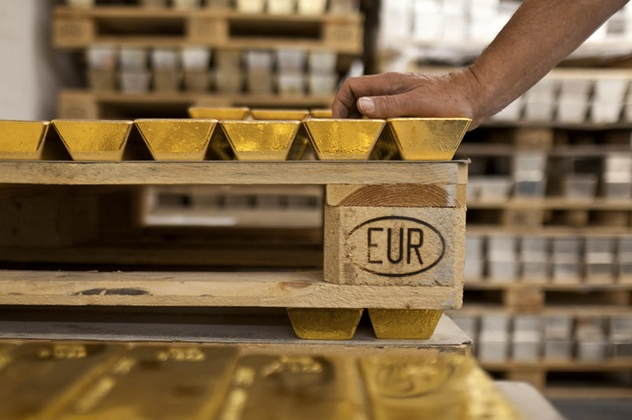Switzerland is home to some of the world’s most important gold refineries. The Swiss authorities say they regularly monitor the origin and transactions of this metal to ensure that they are legal and transparent. (Keystone / Martin Ruetschi) Venezuela is illegally mining and trading in gold, and Switzerland could be one of its clients, according to Swiss media reports. swissinfo.ch spoke to law enforcement, customs and financial authorities to find out whether they are taking action. Swiss public radio RTS opened a Pandora’s box in February by revealing that Venezuela allegedly has an active market for the illegal sale of gold. These revenues would have allowed the government of Nicolas Maduro to boost state coffers at a time when economic sanctions are
Topics:
Swissinfo considers the following as important: 3) Swiss Markets and News, 3.) Swiss Info, Business, Featured, newsletter
This could be interesting, too:
Frank Shostak writes Could an Increase in the Supply of Gold Cause a Boom-Bust Cycle?
Swissinfo writes How the poorest country in Europe is integrating 120,000 Ukrainian refugees
Vibhu Vikramaditya writes Liberty Squandered: The English Tradition from Magna Carta to Empire
Mark Thornton writes Gold Is the Answer to Prohibition

Switzerland is home to some of the world’s most important gold refineries. The Swiss authorities say they regularly monitor the origin and transactions of this metal to ensure that they are legal and transparent. (Keystone / Martin Ruetschi)
Venezuela is illegally mining and trading in gold, and Switzerland could be one of its clients, according to Swiss media reports. swissinfo.ch spoke to law enforcement, customs and financial authorities to find out whether they are taking action.
Swiss public radio RTS opened a Pandora’s box in February by revealing that Venezuela allegedly has an active market for the illegal sale of gold. These revenues would have allowed the government of Nicolas Maduro to boost state coffers at a time when economic sanctions are intensifying against the South American country and oil prices have reached historic lows.
A call for help
In January, Juan Guaidó, leader of the Venezuelan opposition and president of the National Assembly, asked for help from the community of international leaders gathered in Davos to stop illegal gold mining in the Amazon.
During an address at the World Economic Forum in Davos, he said that those who buy Venezuelan gold are financing “a criminal international conglomerate” and armed groups such as the National Liberation Army (ELN) in Colombia.
He said “the first thing to do is to stop the illegal traffic of gold. We need to protect indigenous population. It is blood gold. And to achieve this, sanctions and the support of the international community are needed.”
The RTS investigation revealed that Switzerland could be one of the buyers of this precious metal and that its banks are not exempt from receiving non-transparent funds related to Venezuelan gold.
So what do Swiss authorities have to say about all this?
Reasonable suspicion required
Rachel Strebel, spokeswoman for the Office of the Attorney Generalexternal link of Switzerland (OAG) confirmed in writing to swissinfo.ch that so far “no criminal investigation proceedings have been opened” in connection with Venezuelan gold transactions. Nonetheless, Switzerland is keeping a close eye on the matter given the nature of business ties with Venezuela.
In 2019, the U.K.’s National Crime Agencyexternal link (NCA) seized a shipment of gold worth CHF5 million ($5.2 million) at London’s Heathrow airport as part of an international investigation into an alleged Venezuelan drug cartel. The NCA then reported that the precious metal was being transported from the Cayman Islands to Switzerland.
The same year, according to the Venezuelan opposition, an official plane of the Venezuelan government landed in Zurich with illegal gold. The cargo was not checked because it was an official plane benefitting from diplomatic status. After the Swiss stopover, the plane completed its journey to Abu Dhabi, the capital of the United Arab Emirates.
According to the Office of the Attorney General there are no ongoing investigation processes for legal reasons: “The OAG has exclusive jurisdiction over the offences listed in articles 23 and 24 of the Swiss Code of Criminal Procedure,” says Strebel.
These articles state that “investigations into the trade in gold, or its provenance, are not the responsibility of the OAG, unless they relate to a crime that is subject to national jurisdiction.”
On the evidence presented by the Swiss press, Strebel said there must be “a reasonable suspicion that a crime has been committed and, normally, press articles are not sufficient to meet the requirements [set out in Article 309 of the Code of Criminal Procedure]” to open an investigation.
Constant scrutiny
Switzerland has four of the six largest gold refineries in the world. Given the alleged gold trade between Switzerland and Venezuela, NGOs like Swissaid, cited by RTS, fear that money originating from illegal activities will be laundered and end up in Swiss banks.
To prevent this, the Anti-Money Laundering Act requires financial intermediaries to know their customers well and to employ due diligence measures that reduce the risk of committing this offence.
Vinzens Mathys, spokesman for the financial markets supervisory authority FINMA, declined to confirm to swissinfo.ch whether there are any ongoing investigations into Venezuelan gold. He did, however, offer insight into how the regulatory body typically proceeds.
“With regard to gold, a distinction must first be made: one thing is the trading of precious metals by banks [an activity carried out by the financial sector] and another is the import and smelting of raw gold [for the manufacture of gold goods] as an industrial activity,” he explained.
“The purpose of the Anti-Money Laundering Act (AMLAexternal link) is to prevent illicit funds from reaching the financial sector as the proceeds of the banking precious metals trade,” he says.
Therefore, “persons who trade in precious metals in banks [as defined by the Ordinance on the Control of Trade in Precious Metals], either on their own account or for third parties, must comply with the AMLA, as they are financial intermediaries,” says Vinzens Mathys. But those who trade in non-banking gold fall outside the purview of FINMA.
A modest bilateral trade
The markets for smelting and refining metals, for example, are activities that are not related to banking gold. Nor is the import of raw gold by companies that use it to manufacture other products subject to anti-money laundering legislation.
In this case, the Federal Customs Administration is responsible for ensuring that this type of transaction is transparent. The Office of Precious Metal Control carries out import controls and there is also a Precious Metal Control Act that imposes due diligence measures on those who hold licenses for smelting and melting metals.
swissinfo.ch asked the customs authority what the latest figures were for gold trade between Switzerland and Venezuela. It pointed to foreign trade statistics for 2019 which include only the import of one kilogram of common metal jewellery from Venezuela (documented under tariff classification 7117.9).
This means that, according to official figures, imports of Venezuelan gold are practically non-existent in Switzerland.
Donatella Del Vecchio, the spokeswoman for French-speaking Switzerland, has declined to say whether the customs authority has identified any irregular gold trade operations between Switzerland and Venezuela over the past 24 months.
“For security reasons, we cannot provide any information on our monitoring operations,” she said.
According to Swiss public radio RTS, however, Switzerland would be importing gold on a large scale from the island of Curaçao, which has no mines, so it is presumed that this gold comes almost entirely from Venezuela.
The passage of the gold through several countries before reaching Switzerland could be the key to the scheme, but also the reason why the Swiss authorities could hardly prove that the origin of the metal is Venezuela, according to the RTS report.
An eye on smelters
This does not mean that Switzerland is not aware of possible crimes related to the gold trade.
Del Vecchio points out that many rules must be respected: there are provisions for holders of a smelting licence (Precious Metals Control Act) in addition to those governing trade in precious metals for the banking sector.
Foundry licences are issued by the Central Office for the Control of Precious Metals and have a duration of four years. Therefore, compliance with due diligence obligations is regularly monitored.
“The licensee can only accept molten material from partners who can prove their legal acquisition and therefore must verify the identity of the contracting partner. In case of doubt, they must clarify the origin of the cast material in more detail. If there is any suspicion that the material has been acquired illegally, you must inform the police and hold the material until the investigation is completed,” explains the spokesperson.
Subsequently, the marketing of precious metals “is subject to the Money Laundering Act, intermediaries need a license provided by FINMA, or must be affiliated with a self-regulatory organisation,” she reiterates.
Thus, faced with potential illegal operations that would link Switzerland to the Venezuelan gold market, the Swiss authorities confirm that they are all vigilant, but do not report whether there are any investigations under way. Knowing how to keep guard is vital in times when global attention is elsewhere.
Tags: Business,Featured,newsletter








